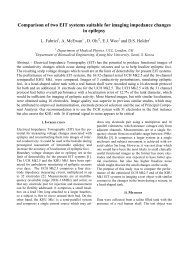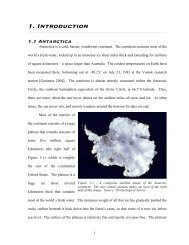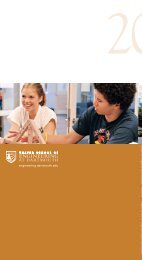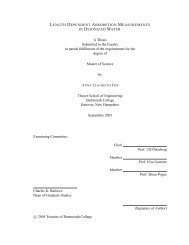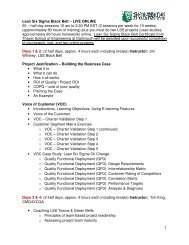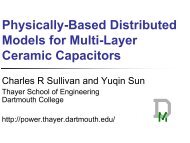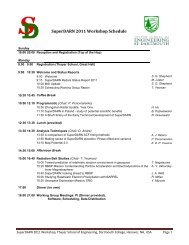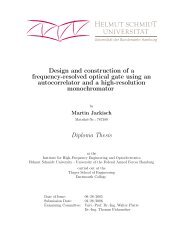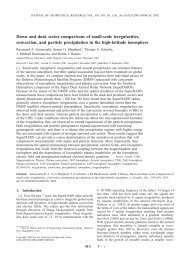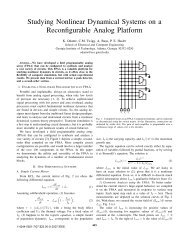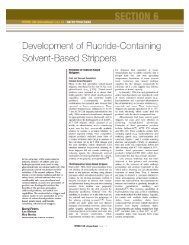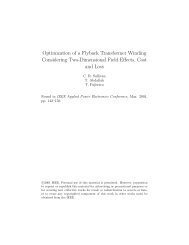Courses Programs - Thayer School of Engineering - Dartmouth ...
Courses Programs - Thayer School of Engineering - Dartmouth ...
Courses Programs - Thayer School of Engineering - Dartmouth ...
Create successful ePaper yourself
Turn your PDF publications into a flip-book with our unique Google optimized e-Paper software.
undergraduate courses<br />
74<br />
ENGS 51 Principles <strong>of</strong> System Dynamics<br />
Offered: 11S, 12S: 10A<br />
This course introduces system dynamics, an approach to policy design and analysis<br />
based upon feedback principles and computer simulation. The approach is useful for<br />
gaining an understanding <strong>of</strong> the underlying structural causes <strong>of</strong> problem behavior in<br />
social, economic, political, environmental, technological, and biological behaviors,<br />
and for designing policies aimed at improving them. Lectures and exercises illustrate<br />
applications <strong>of</strong> the approach to real, current problems such as urban decay, resource<br />
depletion, environmental pollution, product marketing and distribution, and agricultural<br />
planning in an expanding population. The similarity and transferability <strong>of</strong><br />
underlying feedback characteristics among various applications is emphasized. No<br />
prior engineering or computer science experience is necessary.<br />
Prerequisite: MATH 3<br />
Instructor: Peterson Dist: TAS<br />
ENGS 52 Introduction to Operations Research<br />
Offered: 11W, 12W: 10A<br />
Basic concepts <strong>of</strong> optimization are introduced as aids in systematic decision making<br />
in engineering contexts. Deterministic optimization is developed in the form <strong>of</strong><br />
linear and integer programming and their extensions. Probabilistic models are<br />
introduced in terms <strong>of</strong> Markov chains, queuing and inventory theory, and stochastic<br />
simulation. The course emphasizes the application <strong>of</strong> these methods to the design,<br />
planning, and operation <strong>of</strong> complex industrial and public systems.<br />
Prerequisite: MATH 8<br />
Instructor: Santos Dist: TAS<br />
ENGS 56 Introduction to Biomedical <strong>Engineering</strong><br />
Offered: 11S, 12S: 2, laboratory<br />
This course will survey applications <strong>of</strong> engineering principles to medical diagnosis/treatment<br />
<strong>of</strong> disease, monitoring/measurement <strong>of</strong> physiological function, and<br />
rehabilitation/replacement <strong>of</strong> body dysfunction. Case studies will be used to highlight<br />
how engineering has advanced medical practice and understanding. Examples<br />
will be drawn from bioinstrumentation, bioelectricity, biotransport,<br />
biomaterials, and biomechanics. While investigations will focus primarily on the<br />
engineering aspects <strong>of</strong> related topics, issues surrounding patient safety, public policy<br />
and regulation, animal experimentation, etc. will be discussed as appropriate.<br />
Prerequisites: PHYS 13 and PHYS 14; PHYS 14 may be taken concurrently<br />
Instructor: Hoopes Dist: TLA<br />
ENGS 57 Intermediate Biomedical <strong>Engineering</strong><br />
Offered: 11S: 2<br />
The basic biomedical engineering concepts introduced in ENGS 56 will serve as the<br />
foundation for exploring technology in a clinical environment. The specific clinical<br />
setting to be explored will be the operating room (OR). This course will introduce a<br />
variety <strong>of</strong> surgical procedures and technologies from an engineering perspective.<br />
Areas <strong>of</strong> focus will include patient monitoring, biophysical tissue properties, general<br />
surgical instrumentation, tissue cutting and binding technologies, and optical visualization<br />
technologies. In addition, state-<strong>of</strong>-the-art procedures employing image-guided,<br />
minimally invasive, laparoscopic, and robot-assisted surgical technologies will be discussed.<br />
The first half <strong>of</strong> the term will include weekly seminars presented by surgeons<br />
describing a particular surgical procedure, the technologies currently used and a surgeon’s<br />
“wish-list”. During the second half <strong>of</strong> the term, students will undertake a<br />
design project aimed at developing a technology that addresses a specific need within<br />
the OR. Enrollment is limited to 18 students.<br />
Prerequisites: ENGS 23 and ENGS 56 or equivalent<br />
Instructor: Halter Dist: TAS




